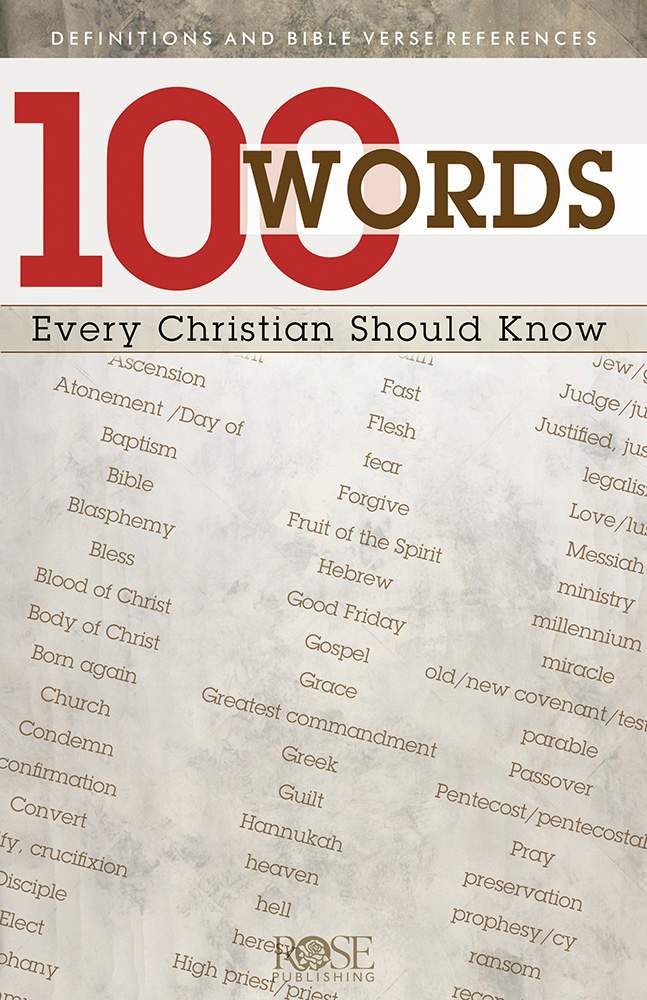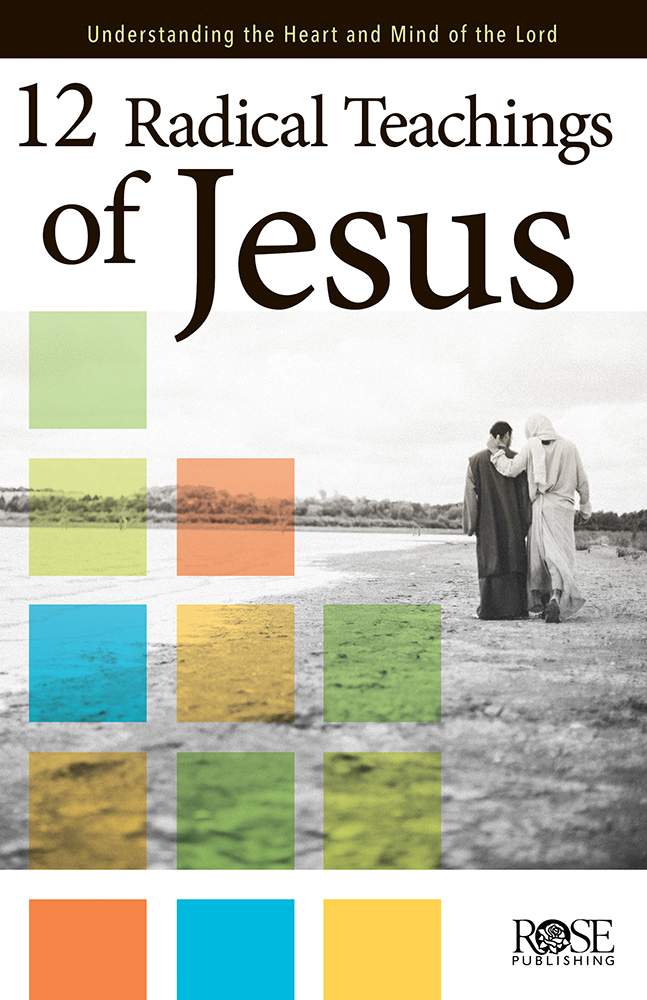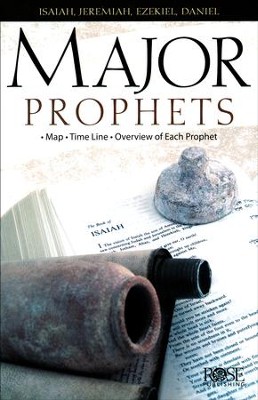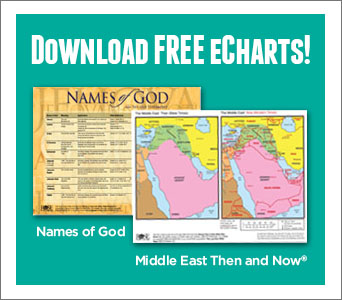
Summer’s here! And you know what that means: a lot of Bible studies go on summer break! But what if your group wants to continue diving into the Word? After all, there are only so many out-of-town weeks you can take, right?
If your Bible study leader needs a break (maybe YOU’RE the leader), we’ve got some incredible resources you can use to make small group prep easy! You can find the FREE Bible study questions here too! Plus, I’ve got an insider tip for you on quantity discounts here! Save when you buy for your whole small group! All you need are your Bibles, your group, and some of these:
100 Words Every Christian Should Know
100 Words Every Christian Should Know is packed with easy-to-understand explanations of 100 commonly used terms and concepts in the Bible and church, such as justification, miracle, legalism, and more! Easily add depth to your Bible study and reading when you see each Bible term’s meaning at a glance! 14 fold out panels, unfolds to 33 inches long.
Unlike heavy dictionaries and Bible commentaries, which can be hard to quickly reference and carry around with you, this slimline pamphlet on the top 100 words and phrases is easy to carry and slips right into the back of your Bible! With the turn of a page, you can quickly reference 100 Christian terms like “holiness,” “justification,” “trinity,” and more PLUS their definitions and Bible references all at your fingertips!
>> Bible Study Questions on 100 Words Every Christian Should Know Here:
- Read the definitions for “grace” and “redemption.” Because God has forgiven us while we were undeserving, we as believers get to live in grace. Think of the last thing you purchased at a store; perhaps it’s groceries or a book. You paid the money and it now belongs to you, and no longer belongs to the store. How does that illustration demonstrate God’s forgiveness of our sins?
- Read the definition for #27 “elect.” As a believer, you’ve been elected by God before time began. Can you think of a moment when you didn’t know or feel like God chose you? Maybe you felt bad about yourself or were self-critical. How did that influence your choices, and what differences would it have made if you had the revelation that God chose you?
- Read #58. In society, laws are set up for the safety of others and to protect freedom. The consequences range from warnings and fines to imprisonment, or even death. What are the purposes and consequences of breaking God’s law?
- Take a look at the definition for the word “bless.” We bless others, and even our enemies, because God has blessed us. Come up with 3 ways God has blessed you and one way you have blessed another. Write down 5 more ways you can bless someone else.
- Term #80, “sacrifice,” shows 3 examples of sacrifice; what sacrifices, large and small, do you make to serve God? What sacrifices do you make to love those around you?
- Look at #77 (“repent”) and then #23 (“conversion”). Why do you think the act of turning or changing one’s mind is so important to God? Think of an instance when it was difficult to repent. What factors helped you make that necessary changes?
- The two words for #30, “exegesis” and “eisegesis” are words you may or may not have used before. Why is it so important to practice “exegesis” and not “eisegesis?” Think of examples where eisegesis was used instead of exegesis in the Scriptures (hint: think of the Pharisees) and then in your personal experiences.
- Justification (#56) changes the way we think about our relationship with God. Read the definition and the references. Is it difficult for you to accept by faith that Christ has justified you? Why or why not?
- Jesus used parables (#66) to teach heavenly ideas using everyday objects and concepts from his time. Think of your favorite parable using modern day examples (i.e. instead of farming think about investing, instead of a lost sheep think of the family pet). Does this change your perspective about the parable and how you apply the lesson to your life? How?
- Read the definition for “ministry” (#62). What are some natural abilities and talents that you enjoy? In what ways can you apply those gifts to minister to God and to meet the needs of others?
12 Radical Teachings Of Jesus Bible Study Pamphlet
Jesus challenges us to leaving behind convenience, comfort, security, money, and even family to follow him. He calls his disciples to abandon everything for the gospel, but how can we apply that to our 21st century lives? Without fully understanding the cultural context of Jesus’ day, it’s easy to dismiss or forget the important lessons he was teaching. Dig even deeper into the Bible as you see the background, meaning, and application of 12 key teachings of Jesus side-by-side at a glance.
With 12 quick-reference charts, this pamphlet covers the teachings of Jesus in a way few resources can—showing key verses, explanations, reflection questions, and insights at a glance. Includes cross references, application questions, and key points—perfect for quick reference and small group study. From forgiveness to unconditional love, dive into the radical gospel of Jesus at the turn of a page with this slimline pamphlet.
>> FREE 12 Radical Teachings of Jesus Study Questions for Personal Use or Small Groups Here:
- Read #9. Jesus taught his followers to “love your neighbor as yourself.” Think of one action or gesture someone did for you that has left an impression on you. Can you help someone else in the same way this week?
- Read #8. Can you think of a moment when someone showed you forgiveness and you felt surprised by it? What did they do to make you feel like they had forgiven you? Was it a conversation or an action?
- Read #3. Think of a time when you saw someone do a good deed which caused you to give glory to God. You might have thanked the person, but what was it about this action that made you give glory to God?
- Read #8 and #4. It’s one thing to forgive your enemies. It’s entirely another to show them unconditional love as well! What do unconditional love and forgiveness have in common and why are they so difficult to carry out sometimes?
- Read #5. Some people don’t have material earthly treasures. Some people treasure human approval, whether it’s praise, “likes” on social media, fame, etc. Is this type of treasure as distracting as material gains? Why or why not?
- Read page 7 about the Kingdom of God. Read the cross reference 2 Cor. 5:18-21. What does it mean to have been given the “ministry of reconciliation” and “message of reconciliation?” What does that look like in your life?
- Read #11 and pay special attention to the “Know This” section. Jesus wasn’t concerned about politics as we are today, but he emphasized discipleship. Why do you think discipleship is so important? Take a moment to pray and ask the Lord if he wants you to be discipled by someone in your community or even disciple someone!
- Read #2. Think of your friends, coworkers, or people in your community. Are there people that are afraid they won’t make ends meet or find a job? Maybe you can be God’s blessing in their lives by giving a bag of groceries or helping them proofread their resume. Think of a couple ways you can show someone this week that God cares for them.
- Read #1. In what areas of your life do you strive for “firstness?” Is it to get the most compliments on your casserole at the church potluck? Or to get the highest sales at work?
- Read #6. Why is it such a dangerous thing to be hungry for the approval of people? In what areas of your life do you crave attention and praise from others rather than God, and what is the need that only God can fill?
Keep Reading for more FREE Bible study questions!
Major Prophets of the Bible Study Pamphlet
Enjoy having an easy-to-understand overview of the Major Prophets Isaiah, Jeremiah, Ezekiel, and Daniel at your fingertips as you read through these key books of the Bible! Features simple summaries, quick-reference charts, an Old Testament map, time line, historical context, and more!
What do you need to know about each of the major prophets? Why did the Lord give them such strong warnings of disaster? How do they point to Christ? Find out the answer to these questions and more in Rose’s Major Prophets Pamphlet. Understanding the messages of the Major Prophets is key to understanding the whole of scripture. It is in Isaiah, Jeremiah, Ezekiel, and Daniel that we hear not only warnings of disaster, but the prophetic proclamation of the coming of Christ and insight into God’s restoration plan. Enjoy having a solid overview on each of the Major Prophets that shows key information at a glance! Perfect for personal use, small groups, or to add depth to any Old Testament Bible study.
>> Discussion/Reflection Questions for the Major Prophets Pamphlet Here:
- Read Pgs. 1-2 (Importance of the Major Prophets). Many believers are intimidated by the idea of reading the Major Prophets. What are 5 main reasons to do so? What would you say to someone that told you the Major Prophets aren’t relevant to us today? Why are you personally interested in studying the Major Prophets?
- Read Pg. 3 (Ministries of the Major Prophets). God entrusted each of these prophets with words of comfort and instruction to communities of people turned out of their own homes and culture. Why does God choose to speak through us? Can you think of a moment God used someone to speak to you? What was one moment that God used you to share his comfort and love with someone?
- Read Pg. 4 (Among Giants). We still experience rebellion, danger, and disobedience, personally and on a global scale. What current events are going on right now and how should we pray in light of God’s messages through the Major Prophets? Take a moment and pray that God would intervene in these circumstances right now.
- Read Pg. 6 (Christ in the Major Prophets). This section reveals key scriptures from the Major Prophets that prophecy the coming of Christ. How does knowing that these prophecies were made 700-500 years before Christ impact you?
- Read Pg. 8-9 (Called By God). Each of the Major Prophets were set apart and called to specific destinies to reflect God’s glory and personality, despite their faults and failures. What is God calling you to do? What insecurities and shortcomings do you need to place before God?
- Read Pg. 10 (Overview of the Major Prophets). One of the main reasons we should study the Major Prophets is to learn about God’s character and attributes; what characteristics of God do you see in the major themes? (2nd column in chart) Which of these attributes of God have you experienced, and how?
- Read Pg. 11-12 (The Challenges of the Prophets). Reflect on the 3 challenges of the prophets. What things or individuals do we sometimes put ahead of God? What attitudes and behaviors is God challenging you to change today?





